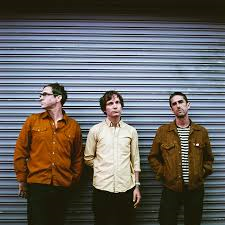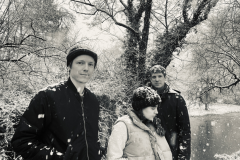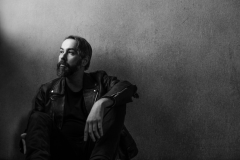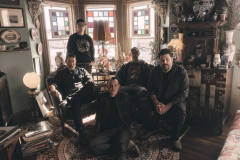Leaving Fingerprints; An interview with John Schmersal of Crooks On Tape
John Schmersal is perhaps best known to Dayton music aficionados and fans as one quarter of one of the Gem City’s most celebrated bands, Brainiac. When Brainiac ended, Schmersal’s next band, Enon, did much to light up the indie rock landscape with some of the same pop weirdness that Schmersal brought to Brainiac.
In the two decades since Brainiac’s Bonsai Superstar, Schmersal’s first record with the band, he has kept busy both behind the scenes and on stage. Between recording and producing select projects, he’s played with Caribou and Girls Against Boys, and in 2013 his improvised, avant garde pop project Crooks on Tape – with Rick Lee (Enon, Skeleton Key) and Joey Galvin – saw the light of day via Dayton’s Misra Records.
The unpredictable, enlightened record Fingerprint offered snapshots of the brilliance that happens when likeminded conspirators combine synthesizers, samplers, loopers and good ideas. Ghettoblaster caught up with Schmersal as Crooks on Tape prepared to bring Fingerprint to the masses during a winter 2014 tour. This is what he told us about the group and his former years in Dayton, Ohio.
As of late, you’ve been dividing your time between Caribou and Girls and Against Boys. But Crooks is under your ownership. Was it different being back in the driver’s seat?
Yes it’s very different. In each of these bands I have a different role besides simply playing an instrument. But, with Crooks, that extends beyond into manager, organizer, webmaster, interview taker, etc. If you mean different from the way it was before, aka. Enon days, it’s still pretty much the same.
Is this the first big collaboration you’ve done with Rick Lee since Enon?
We’ve played music since he left Enon and pre COT periodically, but I guess if you mean officially, as far as the world is concerned, or releases… Yes.
How did Joey Galvan come into the picture?
Joey met Rick working a freelance job, sounded pretty accidental. He invited him over to play one day and they really hit off. Rick and I had been intending on getting something together from the onset of when I move to LA. So it wasn’t long before the three of us played together.
Crooks recorded hundreds of hours of material during the creation of Fingerprint. What criteria did you use to decide what would make the final cut?
Being our first album, we wanted to put some kind of pop face on what we were doing. There’s plenty of crazy jams and interesting soundscapes and so, the goal was to find the most interesting pieces to bring together and make a cohesive listening experience. All three of us are fans of the long play album format. So the main thing was to make the album flow like a story unfolding. That being said by today’s standards, most listeners/bands/writers seem more comfortable with an album of songs that mines a limited pallet of sounds or, a series of songs that sound exactly the same all the way through. Crooks will never be guilty of this. And yes I do mean guilty!
When did the sessions for Fingerprint begin and where was the material recorded?
We set up shop in the place Rick used to live in Hollywood. A garage space that had been previously converted into a studio. It was already sufficiently soundproofed and ready to be filled with our gear. Recordings began in early 2010 and continued off and on through 2012. After which time Rick moved and we dissolved the recording space.
I’m assuming Fingerprint was engineered by the band, correct?
95 percent was yes. I set up the gear in such a way that we could just arrive and begin to play/record with all the levels already set. Since we had no studio in 2013, we did record drums at a friend of Joey’s for a few tracks that ended up on the record. And otherwise I recorded the vocals and did most of the choosing and editing at home or when I was on the road with Caribou.
Is there an element of improvisation to the CoT live show? If so, how much of it is improvised?
That is a very good question and conundrum for us. We never set out to be a band that replicated material from an album. The whole impetus from the outset was to improvise and record. Now we do none of these things.. since releasing Fingerprint. There will be some improvised pieces coupled with the record material and there will be unscripted improvised moments that take place in some of the album material as well. We want to keep it interesting for us and the audience. So there’ll be album material for those familiar, and also some improvisation to keep things exciting hopefully for everybody. This is the most exciting band I’ve been in because I literally don’t know what will happen next and that keeps it challenging for us all as well.
When and under what circumstances did you decide to relocate to Los Angeles?
I got to Los Angeles on January 1, 2010. There were no circumstances other than the desire to move again. I was living in Philadelphia before that and was not getting much freelance work from there. I knew I would be touring for the next several years with Caribou and my wife and I discussed our general dissatisfaction with living in Philadelphia. Los Angeles is simply the city where most of our friends live or have moved to and there are the most opportunities for me as a freelancer in music. We ruled out moving back to New York City and decided On Los Angeles.
What was it about Dayton that made it a good proving grounds during your formative years?
Proving grounds? When I moved back to Dayton and joined Brainiac the waters were very fertile musically speaking…. Guided by Voices, Breeders, etc. But also Dayton is/was a sleepy town where the riches could be found in the pawnshops and thrift stores locally. This is pre-eBay. I think it was important to be in a city that had a tiny music buzz but, one that did not really affect the attitudes or egos of the band and allowed us to concentrate on just making original music and going on tour. Dayton is and was cheaper than most places to live. I paid a total of $67 per month for rent in 1995 for instance. The rest of the bands parents lived in the Dayton area and that provided a safe haven for them in between tours and pick up jobs.
How did you meet Leo Deluca and what made Misra a fit for this record?
He reached out to me randomly and I began to share some of Crooks music with him at that point. It was one of those great “right place right time” kind of things.
Your Dayton show is with Swim Diver, which is Tyler Trent’s new band. Have you kept in consistent contact with him since Brainiac? Will this be the first time you’ve shared a stage in over a decade?
Tyler and I have been in contact over the years and it is not the first time I will of shared a stage with him since Brainiac. When he was playing with The Dirty Walk, they supported Enon for some shows in the Midwest.
(Visit Crooks On Tape here: https://www.facebook.com/crooksontapemusic.)









Social Media